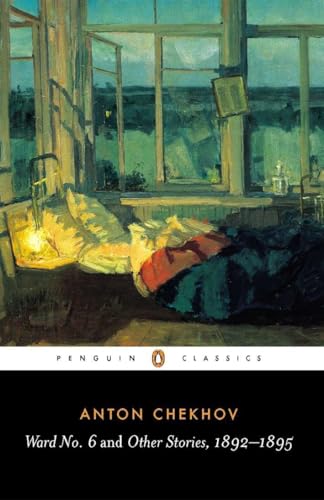Ward No. 6 and Other Stories, 1892-1895 (Penguin Classics)
Anton Chekhov
BOOK REVIEW

In the annals of literature, few names resonate with the piercing clarity and raw complexity that Anton Chekhov embodies. His masterwork, Ward No. 6 and Other Stories, published in the late 19th century, stands as a testament to mankind's eternal struggle with the human condition-a reflection that pierces through time and space to reveal our innermost fears and desires. This collection is not just a recounting of tales; it is a profound meditation on sanity and madness, a haunting exploration of the delicate threads that bind us to our humanity.
Chekhov, a prominent playwright and short story writer, conjured a world filled with psychological depths that had seldom been explored before. Born into a family plagued by hardship, his early life in Taganrog shaped a man intimately familiar with despair, yet armed with an acute sense of observation. It is these observations, filled with empathy yet laced with a stark realism, that populate the pages of this collection. Chekhov's tales expose the absurdity of everyday life, revealing the fragility of the human psyche-a theme vividly captured in the titular story, "Ward No. 6."
Within the confines of a decrepit mental institution, "Ward No. 6" unfolds a chilling narrative that confronts societal norms while challenging our perceptions of sanity. Chekhov plunges the reader into a world where the line between madness and reason blurs, and he deftly illustrates how societal indifference can transform the very fabric of human existence. The protagonist, a doctor who finds himself entangled in the lives of the patients, becomes a mirror reflecting our fears-the reality that we are all, in some way, prisoners of circumstance.
🧠 The narrative is rich in emotional turmoil, as Chekhov doesn't simply present the plight of the characters; he invites you to feel their despair and, ultimately, their humanity. Readers have noted how Chekhov manages to evoke empathy even for the most troubled souls, forcing us to question our own judgments. Some call it "brilliantly haunting," while others have decried it as "too bleak." But therein lies the beauty of Chekhov-a writer who refuses to sugarcoat the truth, daring us to wrestle with the complexities of human nature.
As you traverse through the additional stories, such as "The Complaints Book" and "A Woman's Kingdom," you will feel the tension and the underlying currents of societal critique that characterize Chekhov's work. Here, you'll recognize the profound significance he placed on the ordinary lives of individuals, especially women who were often relegated to the shadows of existence. His ability to weave microcosms filled with vivid characters grappling with their destinies across different walks of life resonates powerfully, garnering Chekhov both admiration and heated criticism; some argue his explorations lack resolution, leaving an unsettling void.
Yet, to dismiss Chekhov's lack of clear endings is to overlook his genius. He crafts an intricate web of emotion that lingers long after the final page has turned. It's an invitation to reflect-an entreaty that perhaps the answers to our struggles are not found in resolutions but in the poignant questions themselves. In a world increasingly divided, Chekhov's stories compel us to confront uncomfortable truths, igniting conversations about mental health, societal indifference, and the depths of human connection.
In an era marked by rapid change and disconnection, Chekhov stands as a timeless figure whose work demands our attention. His subtle yet potent critique echoes today, acting as a bridge to understanding the complexities of our lives, a guide through the chaos. Readers of all backgrounds find themselves entwined in his narratives, often describing the experience as "eye-opening" or "achingly beautiful."
Ward No. 6 and Other Stories emerges not merely as literature but as a call to action: to confront our fears, to extend empathy toward those deemed "other," and to acknowledge the mosaic of human experience that binds us all. So, are you willing to step into Chekhov's world? To lose yourself in the intricacies of despair and hope? To embrace this journey is to honor the very essence of what it means to be human. 🌌
The echoes of Chekhov's characters continue to resonate, reminding us that we are not alone in our struggles. His legacy is not just confined to the literary canon; it serves as a powerful conduit for change in our understanding of mental health, a crucial dialogue that remains ever relevant. As you close the book, the stories will resonate within you, their emotional weight compelling you to reflect on your own life, and perhaps, to become a little kinder to yourself and others.
📖 Ward No. 6 and Other Stories, 1892-1895 (Penguin Classics)
✍ by Anton Chekhov
🧾 368 pages
2002
#ward #other #stories #1892 #1895 #penguin #classics #anton #chekhov #AntonChekhov